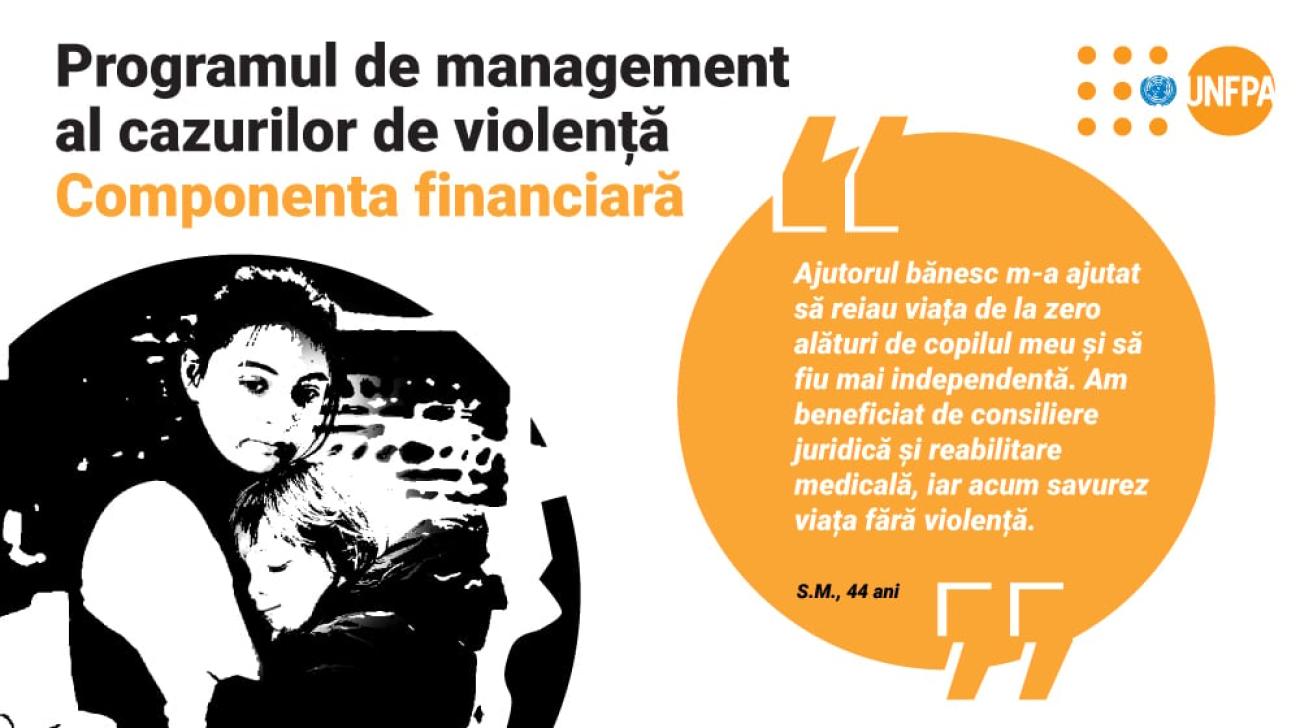Bogdana, survivor of violence: "Cash assistance saved my life"

Bogdana* is a refugee from Ukraine who has enjoyed comprehensive assistance and financial support within the Violence Case Management Program, piloted by UNFPA.
Over the past two years, more than 300 girls and women from Moldova and refugees from Ukraine, survivors of gender-based violence (GBV), have enjoyed comprehensive assistance and financial support within the Violence Case Management Program, piloted by UNFPA, which helped them overcome situations of abuse and build a new life.
Bogdana*, a citizen of Ukraine, is one of these women. Arriving in the Republic of Moldova because of the war, she found refuge in her in-laws' house, but the peace did not last long, because her husband kicked her out of the apartment during the winter, even with the child.
"The war made me feel even more helpless. I went through many hard moments, beatings, swearing, humiliation. An acquaintance advised me to go to the Community Center, where I was helped and included in a special program for women in my situation," she told us.
The Violence Case Management Program is a complex support mechanism for women victims of violence who need a lifeline to continue their lives in difficult circumstances and lay the foundations for a safer future. Developed by the UN Population Fund (UNFPA) in partnership with A.O. "Artemida" and in collaboration with the Ministry of Labor and Social Protection, this Program has several essential components, which ensure the complex rehabilitation of victims and help them escape abuse. An essential element in this process is financial aid, which is often the lifeline for women.
"Thanks to this financial aid, I was able to move to Chisinau for oncological medical investigations and undergo treatment, and with part of the money I rented a room where I now stay with my child."
Financial assistance in violence case management has a beneficial effect on survivors' health, safety and access to violence prevention services. This is only part of a larger process that includes case identification, needs assessment, intervention planning, referral to other services, case monitoring and supervision.
Silvia*, another survivor of violence, endured several acts of cruelty during her marriage: "Following the last act of violence, my hand was fractured and I had to borrow money to have an operation in Chisinau. Thanks to this Program in which I was included, I received free legal assistance and psychological counseling, and with the help of financial support, I had the opportunity to undergo several rehabilitation procedures at a hospital in the capital, pay for my transport and have a life independent with my child", says the woman.
The granting of financial aid is based on the assessment of the real needs of each person and is carried out by bank transfer. Assistance is provided either as an emergency for immediate needs or in installments, depending on the duration of the need for support.
“Cash assistance gives women the freedom to choose. Women's lives and well-being are put at risk in the absence of options, especially in crisis situations. This is especially true for women who already face heightened risks of violence. Interventions empower vulnerable women to use the money they give as part of an integrated, survivor-centred approach. Cash allows for flexibility, it provides crucial support to vulnerable groups in a more flexible, tailored and discreet way than other types of assistance," said Violeta Terguță, GBV Program Analyst at UNFPA.
"Financial support is vital help for victims of violence, giving them the support and resources they need to overcome trauma and regain control of their lives. By facilitating access to specialized counseling, safe shelters and legal assistance, we significantly contribute to the empowerment of affected women, allowing them to rebuild a safer and more independent future", said Simion Sîrbu, Director of A.O. "Artemida".
Cash assistance for survivors of gender-based violence is a crucial element in the management of cases of violence and is being implemented in the Republic of Moldova from 2023, as part of a pilot program carried out by A.O. "Artemida" in partnership with the United Nations Population Fund, and is part of the UNFPA support offered to the Government of the Republic of Moldova, in response to the refugee crisis.
*Names have been changed to protect identity.



